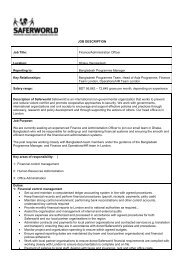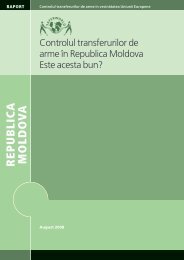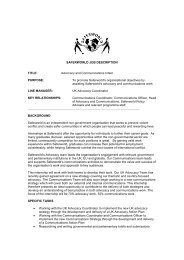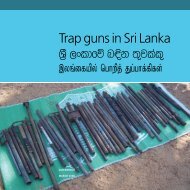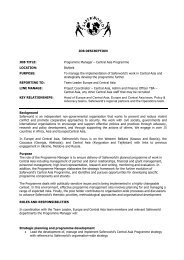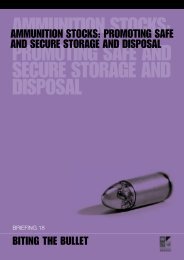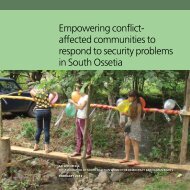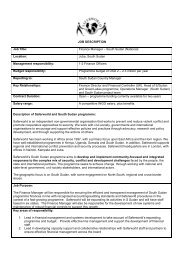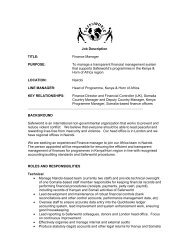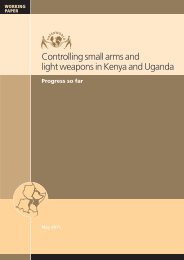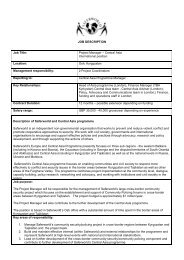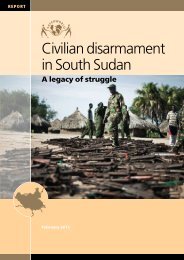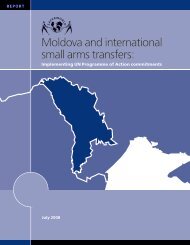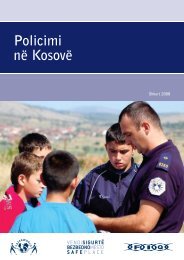Russia's impact on global security: Russia's arms trade ... - Saferworld
Russia's impact on global security: Russia's arms trade ... - Saferworld
Russia's impact on global security: Russia's arms trade ... - Saferworld
You also want an ePaper? Increase the reach of your titles
YUMPU automatically turns print PDFs into web optimized ePapers that Google loves.
Proposed areas of inquiry for Foreign Affairs Committee Inquiry<br />
Russia’s <str<strong>on</strong>g>impact</str<strong>on</strong>g> <strong>on</strong> <strong>global</strong> <strong>security</strong>: Russia’s <strong>arms</strong> <strong>trade</strong><br />
A. Summary<br />
1. This briefing draws <strong>on</strong> a recent <strong>Saferworld</strong> report <strong>on</strong> small <strong>arms</strong> proliferati<strong>on</strong>,<br />
transparency and implementing resp<strong>on</strong>sible <strong>arms</strong> export c<strong>on</strong>trols in Russia<br />
(1). The report is intended to help spark debate and further research <strong>on</strong> small<br />
<strong>arms</strong> in Russia, but also raises c<strong>on</strong>cerns relevant for this inquiry, including the<br />
export of Russian small <strong>arms</strong> and light weap<strong>on</strong>s (SALW) to Algeria, Eritrea,<br />
Ethiopia, India, Syria, Venezuela and Yemen as part of an effort to expand<br />
<str<strong>on</strong>g>Russia's</str<strong>on</strong>g> export markets in Africa, Asia, the Middle East and South America.<br />
2. Russia is the sec<strong>on</strong>d largest <strong>arms</strong> producer and exporter in the world. It is<br />
also <strong>on</strong>e of the world's largest SALW producers and <strong>on</strong>e of the most active<br />
countries <strong>on</strong> the world SALW market. It c<strong>on</strong>tinues to export a broad range of<br />
SALW types and models. Increases in Russia’s military and internal <strong>security</strong><br />
budgets and spending could signal an increase in SALW producti<strong>on</strong> and <strong>trade</strong>.<br />
3. There are major c<strong>on</strong>cerns about the quality and implementati<strong>on</strong> of Russia’s<br />
<strong>arms</strong> transfer c<strong>on</strong>trols. Russian Government does not apply criteria-based<br />
approach in its decisi<strong>on</strong>s <strong>on</strong> licensing <strong>arms</strong> exports, such as that enshrined in<br />
the EU Code of C<strong>on</strong>duct <strong>on</strong> Arms Exports. There are c<strong>on</strong>cerns that human<br />
rights and the humanitarian situati<strong>on</strong> in recipient countries are not given<br />
priority in licensing exports, despite Russia’s existing obligati<strong>on</strong>s under<br />
internati<strong>on</strong>al law (including internati<strong>on</strong>al treaties) and commitments to a<br />
variety of internati<strong>on</strong>al, multilateral and regi<strong>on</strong>al initiatives.<br />
4. Public informati<strong>on</strong> c<strong>on</strong>cerning Russian producti<strong>on</strong> and <strong>trade</strong> of armaments,<br />
especially SALW, is also often difficult to obtain, inaccurate or shrouded in<br />
excessive secrecy. The problem is compounded by the fact that the Russian<br />
Government is subject to limited or no pressure from the general public, as<br />
well as its own parliament, to become more ‘transparent.<br />
5. The UK Government is <strong>on</strong>e of the co-authors of the UN General Assembly<br />
resoluti<strong>on</strong> <strong>on</strong> the internati<strong>on</strong>al <strong>arms</strong> <strong>trade</strong> treaty (ATT). The resoluti<strong>on</strong> w<strong>on</strong><br />
support from 153 UN member states. However, Russia was am<strong>on</strong>gst 24<br />
countries that abstained, so it will be important for the UK Government to<br />
c<strong>on</strong>sider how to promote internati<strong>on</strong>al <strong>arms</strong> c<strong>on</strong>trols and the ATT with Russia.
B. Key Questi<strong>on</strong>s for the Inquiry<br />
• What efforts are underway to promote effective <strong>arms</strong> transfer<br />
c<strong>on</strong>trols in Russia<br />
• How can the UK Government support efforts towards greater<br />
transparency and accountability of Russia’s <strong>arms</strong> <strong>trade</strong><br />
• What efforts have been made to engage Russian decisi<strong>on</strong> makers <strong>on</strong><br />
the benefits of increased public transparency, for example, through<br />
the publicati<strong>on</strong> of detailed annual reports <strong>on</strong> <strong>arms</strong> exports<br />
• What measures is the UK Government taking to encourage Russia to<br />
support the ATT<br />
C. The value of Russian small <strong>arms</strong> and light weap<strong>on</strong>s<br />
exports<br />
6. <strong>Saferworld</strong> has collected a range of estimates for Russian SALW exports for<br />
the period 2000–2005 from a number of reputable experts <strong>on</strong> Russian <strong>arms</strong><br />
exports. Based <strong>on</strong> these figures, Russian SALW exports are estimated to be<br />
worth somewhere between US$60–200 milli<strong>on</strong> per year.<br />
7. It is very difficult to discern SALW <strong>trade</strong> patterns from the very partial data<br />
that is available in open source materials. However, using Rosobor<strong>on</strong>export’s<br />
official Russian <strong>arms</strong> export figures, and the assumpti<strong>on</strong> that Russian SALW<br />
exports c<strong>on</strong>stitute somewhere between 2–5% of total <strong>arms</strong> exports, a range<br />
of US$73–300 milli<strong>on</strong> per year has been calculated for average annual<br />
Russian SALW exports for the period 2000–2005. However, these figures are<br />
still very rough estimates as SALW exports may not c<strong>on</strong>stantly fall between<br />
2–5 percent of all Russian c<strong>on</strong>venti<strong>on</strong>al <strong>arms</strong> exports.<br />
8. The publicati<strong>on</strong> of comprehensive, detailed and clearly structured informati<strong>on</strong><br />
<strong>on</strong> nati<strong>on</strong>al <strong>arms</strong> exports c<strong>on</strong>trols is key to ensuring the highest possible<br />
levels of transparency and accountability. Similarly to the practice of other<br />
major <strong>arms</strong> manufacturing and exporting countries, Russia should produce<br />
annual reports <strong>on</strong> its <strong>arms</strong> exports and imports, which, at a minimum, should<br />
c<strong>on</strong>tain details of what <strong>arms</strong> and dual-use goods are exported and where to.<br />
D. Small <strong>arms</strong> and light weap<strong>on</strong>s exports: destinati<strong>on</strong>s<br />
9. More important than the volume of Russian SALW producti<strong>on</strong> and exports is<br />
the destinati<strong>on</strong> of those exports. While <strong>arms</strong> exports patterns have<br />
traditi<strong>on</strong>ally been used to identify a particular country’s allies and enemies –<br />
i.e. based up<strong>on</strong> to whom they will and will not sell – since the Yelsin era, it<br />
has been assumed that the Russian Government has had few qualms about<br />
selling <strong>arms</strong> to any state that seeks to purchase them, as l<strong>on</strong>g as they are not<br />
subject to an UN <strong>arms</strong> embargo.<br />
10. The Putin era has been characterised by attempts to reduce the number of, or<br />
‘integrate,’ enterprises producing <strong>arms</strong> in Russia. There has also been a<br />
reducti<strong>on</strong> in the number of state enterprises that are legally permitted to<br />
engage in the internati<strong>on</strong>al <strong>trade</strong> in <strong>arms</strong>. From 1 March 2007,<br />
Rosobor<strong>on</strong>export is now the <strong>on</strong>ly company with the right to engage in foreign<br />
<strong>trade</strong> of military goods.
11. Rosobor<strong>on</strong>export has reportedly been providing credits to Russian defence<br />
companies to enable them to begin producti<strong>on</strong> <strong>on</strong> export orders. For example,<br />
<strong>on</strong>e such company, Izhmash, required credit from Rosobor<strong>on</strong>export to be able<br />
to start serial producti<strong>on</strong> of AK assault rifles for a recent Venezuelan order.<br />
Rosobor<strong>on</strong>export officials also plays a key role in the marketing of Russian<br />
<strong>arms</strong> to overseas clients by displaying their wares at a large number of<br />
domestic and internati<strong>on</strong>al <strong>arms</strong> fairs.<br />
12. There are specific c<strong>on</strong>cerns about recent efforts by Rosobor<strong>on</strong>export to<br />
expand Russia’s export markets in a number of ‘unsafe’ destinati<strong>on</strong>s in Africa,<br />
Asia, Latin America and the Middle East. Moreover, Russian portable anti-tank<br />
and surface-to-air missile systems and projectiles are reportedly being sought<br />
by a large number of developing countries.<br />
13. Some Russian analysts have acknowledged that several recipients of Russian<br />
<strong>arms</strong> are regarded as ‘undesirable <strong>arms</strong> recipients’ in other parts of the world,<br />
with Algeria, Eritrea, Ethiopia, Syria, United Arab Emirates and Yemen<br />
recognised as significant but ‘awkward’ markets.<br />
14. <strong>Saferworld</strong>’s recent research finds that established markets for major<br />
c<strong>on</strong>venti<strong>on</strong>al weap<strong>on</strong>s systems, such as India, have purchased SALW from<br />
other suppliers in recent years. However, Rosobor<strong>on</strong>export has attempted to<br />
seize a share of not <strong>on</strong>ly India’s SALW market, but also the broader South<br />
East Asian market as a whole. LW transfers to Ind<strong>on</strong>esia, Malaysia, Thailand<br />
and Vietnam have been recently reported.<br />
15. <strong>Saferworld</strong> shares Amnesty Internati<strong>on</strong>al’s c<strong>on</strong>cern that Russia, a permanent<br />
member of the United Nati<strong>on</strong>s (UN) Security Council, has allegedly broken the<br />
embargo <strong>on</strong> supply of <strong>arms</strong> to all parties in the c<strong>on</strong>flict in Darfur. Amnesty<br />
Internati<strong>on</strong>al’s recent report, Sudan: Arming the perpetrators of grave abuses<br />
in Darfur (2), indicates that Russia is a major supplier of armaments to Sudan<br />
and produced evidence that some of these weap<strong>on</strong>s are being used in Darfur.<br />
The Russian Government has however denied these allegati<strong>on</strong>s.<br />
16. American and Israeli c<strong>on</strong>cerns have also been voiced <strong>on</strong> a number of<br />
occasi<strong>on</strong>s with regard to Russian SALW transfers to Iran and Syria. Russian<br />
SALW sales to Syria have been a particular cause of c<strong>on</strong>cern for these states,<br />
due to suspici<strong>on</strong>s that Syria is diverting <strong>arms</strong> to Hezbollah forces in Leban<strong>on</strong>.<br />
In 2005 and 2006, Israeli officials reportedly presented evidence that Russian<br />
anti-tank guided missiles (ATGMs) and rocket propelled grenades (RPGs) had<br />
been diverted from Syria to Hezbollah. The Russian Government’s October<br />
2006 resoluti<strong>on</strong> <strong>on</strong> post-shipment verificati<strong>on</strong>, which requires a follow up<br />
check by the exporter that the goods were received and used as intended in<br />
the receiving country, is thought to have been directly linked to these<br />
accusati<strong>on</strong>s.<br />
E. Licensed producti<strong>on</strong> of Russian small <strong>arms</strong> and light<br />
weap<strong>on</strong>s<br />
17. The legacy of Soviet technology transfers can still be seen in the large number<br />
of former Warsaw Pact and developing countries that have producti<strong>on</strong> facilities<br />
and assault rifle models that are merely copies of the AK assault rifle. Russia<br />
has AK licensed producti<strong>on</strong> arrangements with Hungary, Israel, Turkey,<br />
Kazakhstan, India and France and was in talks <strong>on</strong> licensed producti<strong>on</strong>
arrangements with China, Italy, the Czech Republic and a number of other<br />
countries in 2006.<br />
18. A licensed producti<strong>on</strong> agreement has also reportedly been c<strong>on</strong>cluded with<br />
Myanmar, am<strong>on</strong>g others, though informati<strong>on</strong> surrounding such deals remains<br />
difficult to obtain. It is also worth noting that there is reportedly a clause in<br />
the c<strong>on</strong>tract for licensed producti<strong>on</strong> of AKs in Venezuela that explicitly calls for<br />
Russian c<strong>on</strong>sent to be sought and successfully received before any<br />
Venezuelan-produced AKs could be exported.<br />
19. At the same time, Russia is a keen advocate of internati<strong>on</strong>al arrangements,<br />
c<strong>on</strong>trols and punishments for the unlicensed manufacture of <strong>arms</strong>, drawing<br />
attenti<strong>on</strong> to the issue at various UN Programme of Acti<strong>on</strong> sessi<strong>on</strong>s and in<br />
other internati<strong>on</strong>al forums. However, as <strong>Saferworld</strong>’s report highlights, there<br />
is mostly likely an ec<strong>on</strong>omic rati<strong>on</strong>ale behind the Russian calls for stricter<br />
c<strong>on</strong>trols <strong>on</strong> unlicensed producti<strong>on</strong> rather than motivati<strong>on</strong>s relating to the<br />
spread of armaments worldwide (3).<br />
20. The fact that more and more countries, including Russia, are increasingly<br />
transferring technology, through licensed producti<strong>on</strong> or other arrangements,<br />
to third countries, which often d<strong>on</strong>'t have very high standards of <strong>arms</strong> transfer<br />
c<strong>on</strong>trols, shows that there is an increased <strong>global</strong> spread of armaments that<br />
requires <strong>global</strong> c<strong>on</strong>trol standards. If a country cannot guarantee compliance<br />
with those standards, a licensed producti<strong>on</strong> deal to that country should never<br />
be authorised. The ATT seeks to establish a set of legally-binding internati<strong>on</strong>al<br />
principles to govern this <strong>trade</strong> and curb the irresp<strong>on</strong>sible transfer of weap<strong>on</strong>s<br />
and ammuniti<strong>on</strong> that serve to prol<strong>on</strong>g and exacerbate violent c<strong>on</strong>flict and<br />
human rights violati<strong>on</strong>s, undermining development prospects.<br />
F. Russia and the <strong>arms</strong> <strong>trade</strong> treaty<br />
21. Russia is sceptical about the future of the ATT initiative and has <strong>on</strong> numerous<br />
occasi<strong>on</strong>s cited, am<strong>on</strong>gst others, a lack of informati<strong>on</strong> by governments<br />
sp<strong>on</strong>soring the ATT initiative, procedural reas<strong>on</strong>s, the hasty pace of the<br />
process, and the challenges of fully implementing, m<strong>on</strong>itoring and enforcing<br />
such a Treaty for its decisi<strong>on</strong> to abstain during the UN vote. However,<br />
Russian officials have also described Russia’s abstenti<strong>on</strong> from the UN vote as<br />
a “positive signal” of Russia’s willingness to have a dialogue <strong>on</strong> the issue.<br />
G. C<strong>on</strong>clusi<strong>on</strong>s<br />
22. In democratic societies, transparency in governmental policies and practice is<br />
a key feature for ensuring public oversight and government accountability.<br />
This is particularly important in a sensitive area such as producti<strong>on</strong> and <strong>trade</strong><br />
in <strong>arms</strong>, where the country’s internati<strong>on</strong>al image and reputati<strong>on</strong> – as a<br />
resp<strong>on</strong>sible <strong>arms</strong> producer and exporter – is at stake.<br />
23. Greater transparency and openness in this sphere would give Russia<br />
additi<strong>on</strong>al credit as a new democracy, increasingly bringing its practices into<br />
line with those of its internati<strong>on</strong>al peers. To this end, a number of<br />
transparency measures have been identified that could assist Russian<br />
policymakers and expert communities to carry out well-informed analyses of<br />
the state of the Russian SALW industry, <strong>trade</strong> and potential markets, and also<br />
dem<strong>on</strong>strate that Russia is an open and resp<strong>on</strong>sible <strong>arms</strong> supplier.
24. These include de-classifying enterprise data <strong>on</strong> SALW employment, profit,<br />
sales and export figures; ensuring Russian SALW-producing enterprises<br />
regularly publish comparable sets of data <strong>on</strong> sales, exports and customers and<br />
providing the UN Commodity Trade Statistics Database and the UN Register of<br />
C<strong>on</strong>venti<strong>on</strong>al Arms with full, accurate and timely data <strong>on</strong> SALW transfers. In<br />
additi<strong>on</strong>, Russia should be encouraged to publish a regular report <strong>on</strong> the<br />
value, volume and recipients of Russian c<strong>on</strong>venti<strong>on</strong>al <strong>arms</strong> transfers, including<br />
SALW.<br />
25. Russia’s role as a leading <strong>arms</strong> exporter and internati<strong>on</strong>al power means that<br />
its support for improved comm<strong>on</strong> internati<strong>on</strong>al standards in <strong>arms</strong> <strong>trade</strong> is<br />
essential. <strong>Saferworld</strong> calls <strong>on</strong> the UK Government to work together with other<br />
EU Governments to engage Russia in the process of setting and implementing<br />
these internati<strong>on</strong>al standards. As part of these efforts, the UK Government<br />
should encourage and facilitate Russia’s participati<strong>on</strong> in multilateral<br />
discussi<strong>on</strong>s around the internati<strong>on</strong>al ATT. There is scope and indeed a need to<br />
intensify policy dialogue and informati<strong>on</strong> exchange <strong>on</strong> the ATT with Russia as<br />
the country’s positi<strong>on</strong> will remain a str<strong>on</strong>g factor in future developments of<br />
the initiative.<br />
ENDS<br />
For further informati<strong>on</strong>, please c<strong>on</strong>tact:<br />
Daniel Tyler, Advocacy and Policy Officer, <strong>Saferworld</strong><br />
Tel: +44 (0)207 324 4671; Mobile: +44 (0) 77066 526 748<br />
(1) Small <strong>arms</strong> producti<strong>on</strong> in Russia, <strong>Saferworld</strong>, March 2007.<br />
(2) Sudan: Arming the perpetrators of grave abuses in Darfur, Amnesty<br />
Internati<strong>on</strong>al, May 2007.<br />
(3) Small <strong>arms</strong> producti<strong>on</strong> in Russia, <strong>Saferworld</strong>, March 2007, p.39.<br />
April 2007<br />
<strong>Saferworld</strong> – 28 Charles Square, L<strong>on</strong>d<strong>on</strong> N1 6HT, UK | Registered Charity no<br />
1043843 | Company limited by guarantee no 3015948 | Tel: +44 (0)20 7324 4646 |<br />
Fax: +44 (0)20 7324 4647 | Email: general@saferworld.org.uk |<br />
Web: www.saferworld.org.uk



